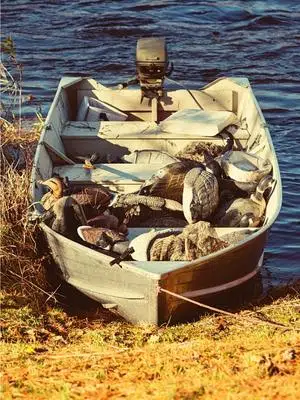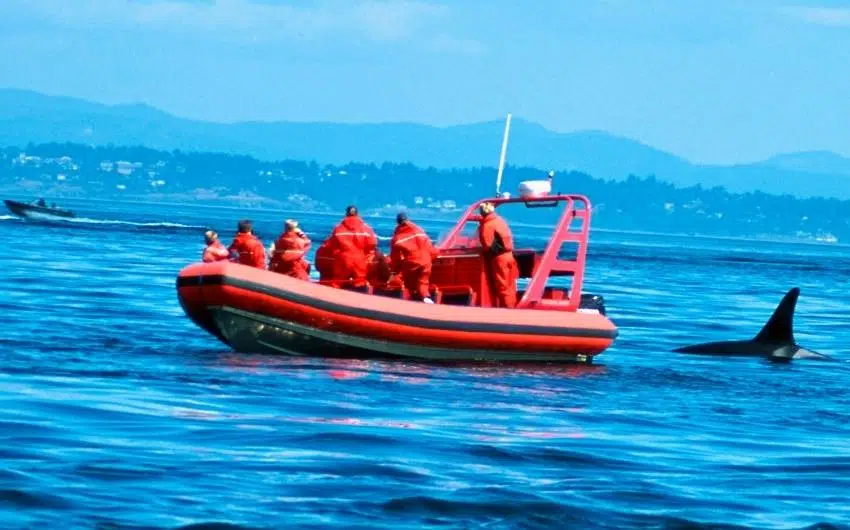What should sportsman always consider when hunting from a boat? When hunting from a boat, there are many things to consider to ensure you have a successful hunt.
It can be challenging to remember everything when you’re out on the open water and your adrenaline is pumping. We have put together these tips for hunters who want to start hunting from boats.
By following these tips, you’ll be able to focus on the hunt and not worry about forgetting something important.
Quick Jump
ToggleWhat Should Sportsman Always Consider When Hunting from a Boat?
What should sportsman consider when hunting from a boat? Always consider the wind direction and speed when hunting from a boat. In addition, make sure that you are aware of how far away your target is before taking a shot.
Hunting from a boat can be tricky, even if you’re an experienced hunter.
You could miss your target or injure an innocent animal if you’re not careful.
When sportsman or hunter take to the open waters in search of big game, there are a few things they should always keep in mind.

Here are four tips to help make your next hunting trip from a boat a success!
- Hunters should be aware of their surroundings and what is going on around them. Being safe is always your number one priority when hunting from a boat.
- Ensure you know the regulations for the area you will be hunting in. There may be specific rules about what kind of firearm or bow you can use and what kind of boats are allowed in certain areas. Familiarize yourself with these regulations before your trip so there are no surprises once you’re out on the cold water.
- If possible, try to scout the area ahead of time to get an idea of where the best spots to hunt might be. Don’t wait until you’re out on the water to start looking for mule deer or other hunting ground game – by that point, it might already be too late!
- Always bring plenty of supplies, a valid hunting license, food, a hunting dog, water, a boating license, and any necessary boating safety equipment like life jackets and flares. Being prepared for anything while out on the open seas is essential!
What Safety Precaution When Hunting from a Boat?
As with any hunting trip, safety should be your number one priority. You should take a few extra boating safety precautions when hunting from a boat.
The greatest danger to a boat is the weather. Check the weather conditions before shooting or releasing any arrow because if anything happens, then there’s no point in having an enjoyable day on the water!
Never fire shots or release arrows until the vessel is stopped, ensure you’re seated when shooting, and keep your crosshair targeting ahead of any obstacles.
What Should Every Person Wear When Hunting from a Boat?
What Should Hunters and Anglers Wear When Hunting or Fishing from a Boat? It’s essential to wear a personal floatation device (PFD) or life jacket when hunting from a boat.
It will help you stay safe in case of an accident and make you more visible to other flat bottoms in the area.
In addition, it’s a good idea to dress in bright colors so you can be easily seen even in low light conditions.
And make sure to avoid wearing any clothing or gear that could potentially get caught on something and cause you to fall overboard.
When Hunting from a Boat, What Is the Best Way to Maintain the Boat Stability?
Here are a few things to remember when hunting from a boat to maintain stability. One of the most important is how you sit in the boat.
It’s best to position yourself back-to-back, with one hunter facing the bow and one hunter facing the rear. This way, your weight is evenly distributed, and you won’t rock the boat as much. It would assist if you also tried to keep your movements minimal, so you don’t upset the balance.
What Is the Major Cause of Boating Accidents Involving Hunters and Anglers?
Boating Accidents Involving Sportsmen Are Usually a Result of What? There are many causes of boating accidents involving hunters and anglers, but the three most common are capsizing, falls overboard, and flooding or swamping.
Capsizing is a prevalent accident among boaters. It can be caused by wave action, wind gusts, or a boat suddenly turning over.
Falls overboard are also common among boaters, especially when they’re trying to retrieve something that’s fallen into the water. And finally, flooding or swamping can occur when a boat sinks or is swamped by a wave.
Why Does Low Head Dams Dangerous to Small Boats and Paddle Crafts?
Surface currents below low-head dams can suck vessels toward the face of the dam.
The hydraulic energy in these currents can flip or pin boats and watercraft against the structure or sweep them downstream. Low-head dams also create a powerful undertow that can quickly exhaust and drown people who fall into the water.
What Is the Characteristic of Low-Head Dams?
Low-head dams, also known as run-of-the-river dams, are a type of hydroelectric dam with a low height — usually with a one-foot to 15-foot drop-off.
This type of dam is different than traditional dams because it doesn’t have a large reservoir behind it. Instead, the water runs directly over the top of the dam and is used to generate electricity as it passes through.
One of the benefits of low-head dams is that they don’t significantly impact the environment. They also don’t require as many construction materials, which makes them cheaper to build.
However, one downside is that they can’t store very much water, so they can only be used when there’s a consistent water flow.
What Piece of Safety Equipment Is Required on Every Canoe and Kayak?
Personal Flotation Devices (PFDs) are required on every canoe and kayak for your float plan. It’s the law in many states.
PFDs are essential safety equipment because they keep you afloat when the boat capsizes. It’s also a great idea to wear a helmet when paddling, especially if you’re white water rafting or kayaking. A helmet can help protect your head from injuries in the event of a fall.
Other safety gear to bring along on your next canoe or kayak outing include a life jacket, first-aid kit, and flashlight.
When Loading a Small Open Boat, Which of the Following Is Important?
When loading the boat, carrying as much in your arms as possible is essential to save time. This way, you can avoid having to make multiple trips back and forth between the dock and the boat.
And remember, always be careful when carrying heavy objects near water – you don’t want to drop anything into the drink!
How Should You Pass a Fishing Boat?
When passing a fishing vessel, it is essential to remember to pass on the port side (left) of the vessel. This gives the fisherman plenty of space to maneuver and cast their nets without fear of being struck by another boat.
Additionally, following these simple tips will help keep everyone safe on the water:
- Always use caution when boating close to other vessels
- Keep a lookout for flat-bottom boats that are not following proper navigation protocols
- Follow all local boating regulations and boating laws.
- Be respectful of other boaters and fishermen – give them plenty of space to work.
What Is One of the Leading Causes of Sportsmen’s Deaths While Boating?
Drowning is one of the leading causes of athletes’ deaths while boating. This happens when someone falls overboard and isn’t able to swim back to the boat.
Most people who drown in this manner are not wearing a life jacket. Ensure everyone on board wears a waterproof jacket to stay safe while boating.
If someone falls overboard, don’t try to go after them – instead, turn the boat around and get them. It’s also important to stay aware of your surroundings and avoid areas with dangerous currents.
What Is the First Thing You Should Do After Retrieving a Boat onto a Trailer?
After you have retrieved your boat onto the trailer, you should first attach the safety chains. Once the chains are attached, you can pull the boat forward by walking behind the trailer.
Make sure to keep a close eye on the boat while it is being towed in case it begins to sway too much.
How Should You Position Your Feet When Capsized and Floating on Your Back in a Swift River Current?
Pointing yourself downstream when capsized and floating on your back in a swift river current would be best. This will help you to drift with the current and avoid being washed against rocks or other obstacles.
It’s also essential to keep your head above water and to relax as much as possible to use less energy. If you feel tired, don’t be afraid to give in and let the current carry you where it will.
In most cases, it’s better to relax and let the current do its thing than to exhaust yourself trying unsuccessfully to swim against it.
Conclusion
So, what should sportsman always consider when hunting from a boat? If you’re planning on hunting from a boat this season, consider the following to ensure a successful and safe hunt. Plan by scouting your location, bring the proper gear, including an emergency kit, and always be aware of your surroundings. Following these vital tips, you can avoid any potential hunting mishaps and have a fun and productive time out on the water.
You might also like
- Do Ducks Fly In The Rain? Duck Hunting Rain (Ultimate Guide)
- What Is The International Emergency Signal For Distress?
- How Can You Show Respect For Other Hunters? (Answered)
- When Should A Hunter Wear A Fall Arrest System? (Solved)
- What Are The Four Main Causes Of Hunting Incidents?


